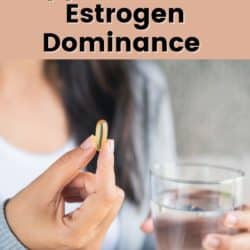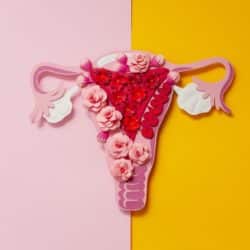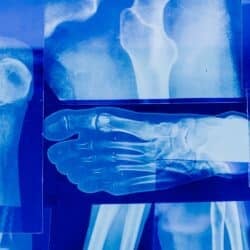13+ Supplements to Reduce Estrogen Dominance
Estrogen dominance is a condition when estrogen gets out of balance with progesterone. This article includes several supplements that can help manage or reduce estrogen dominance and get your hormones back in balance.

Estrogen and Progesterone
Both estrogen and progesterone are steroid hormones produced in the ovaries in women, with some progesterone also being produced in the adrenal glands.
These two sex hormones play a very important part in two of the major systems of the body – the reproductive system and the endocrine system. Although most people consider them to be “female hormones,” men produce them too, but in smaller amounts.
Roles of Estrogen
There are actually three main estrogens – estradiol, estriol, and estrone. Estradiol is most commonly found in women in their reproductive years and is responsible for helping with the development of breasts and the distribution of fat in the hips, and legs.
Estriol is the main estrogen during pregnancy, while estrone is the only estrogen that continues to be made after menopause.
Collectively, these estrogens help with the development of the female sex characteristics and regulate the menstrual cycle. They prepare the body for pregnancy and lactation and even trigger the release of the hormone that causes contractions when it is time for a woman to give birth.
Estrogens have other functions, too. They promote healthy bones in both men and women and are help regulate cholesterol levels.
Roles of Progesterone
Like estrogen, progesterone helps prepare your body for menstruation. It is also responsible for preparing the lining of the womb for accepting a fertilized egg when you become pregnant and preventing further ovulation. If you do not become pregnant, then your progesterone levels lower and menstruation starts again.
What is Estrogen Dominance?
Estrogen dominance occurs when your body has too much circulating estrogen in comparison to progesterone, resulting in a hormonal imbalance. There are several different factors that may cause this imbalance of hormone levels.
Perimenopause
This is the time when your body starts making the transition towards menopause.
As ovulation starts to slow down, your progesterone levels drop. Without enough progesterone to keep it in check, estrogen becomes the dominant hormone.
See my related articles on how to reduce bloating during perimenopause and best supplements and natural treatments for menopause joint pain.
Exposure to outside estrogens
Estrogen dominance can be triggered by too much exposure to estrogen through either our diets or our environments (known as exogenous estrogens).
Foods like flax, soy, and many other plant-based foods are high in phytoestrogens – natural compounds that can behave like the estrogen in our bodies. Eating too many of these foods may raise overall estrogen levels.
Similarly, xenoestrogens – manmade compounds found in many plastics, household products, cosmetics, and other chemicals – also mimic the natural estrogens in our body and cause estrogen dominance.
Imbalanced gut bacteria
Your body needs just the right amount of estrogen-metabolizing bacteria in your gut to keep your estrogen levels where they should be. These bacteria – known as estrobolome – regulate whether or not estrogen is excreted from the body.
Try eating 1-2 raw carrots a day to help improve your gut diversity and help with healthy estrogen metabolism. Or, try my Raw Carrot Salad to help reduce estrogen dominance symptoms.
Poor gut health can also lead to the overproduction of an enzyme called beta-glucuronidase. If this happens, then your body may re-absorb estrogen that should have been excreted, raising your estrogen levels.
Other causes of estrogen dominance
Certain medications can trigger a rise in estrogen levels, including some antibiotics, phenothiazines (used to treat certain mental health conditions), hormone replacement therapy, contraceptives, and some herbal remedies. High estrogen can also run in families.
Read my full article on natural ways to reduce estrogen dominance.
Symptoms of Estrogen Dominance
The symptoms of estrogen dominance can be quite unpleasant and have been compared to those of perimenopause, menopause, and sometimes PMS.
They include:
- Mood swings and irritability – hormones have a huge impact on our mood and a sudden and dramatic mood change could be caused by too much estrogen.
- Loss of libido (reduced sex drive) – this may be caused either by hormonal imbalance, or simply the effect of dealing with the other symptoms.
- Irregular and/or heavy periods – your cycle or the duration of your period may change. Periods may become heavier and more painful. Painful periods or irregular periods can be a sign of hormone imbalance.
- Weight gain – this tends to be focused around the hips, thighs, and abdomen.
- Bloating – particularly around or during the time of your period.
- Hair loss – many women experience some hair loss during or after menopause, but losing hair before menopause may indicate estrogen dominance.
- Increased symptoms of PMS – these include headaches, mood swings, acne, breast tenderness, fatigue, and headaches.
- Difficulty sleeping – hormonal imbalance is a common cause of restless nights. Estrogen dominance can increase feelings of anxiety, which can make sleep even more elusive.
See my article about PCOS and endometriosis. You may also want to read my article on how to eat for your menstrual cycle or my list of the symptoms of estrogen dominance.
Supplements for Estrogen Dominance
Now that we’ve covered the role of estrogens in female body and how estrogen dominance can occur and its symptoms, let’s discuss some of the supplements that can help.
As always, please consult your healthcare provider before making any changes to your supplement routine. Some of these supplements are very powerful so you really should discuss them with your healthcare provider before taking them.
1. DIM
DIM (diindolylmethane) is a plant nutrient found in cruciferous vegetables like broccoli, cabbage, cauliflower, and Brussels sprouts.
DIM isn’t itself a hormone or type of estrogen, but it has a similar structure. When consumed, it aids with the production of “good” estrogen while lowering the production of “bad”, creating a harmonious balance.
To get the full benefit of DIM from cruciferous vegetables, you would need to eat quite a lot every day – around 2 pounds, in fact. A DIM supplement makes it easier to get enough of this nutrient on a daily basis.
You can also try growing and eating broccoli sprouts or broccoli microgreens to help increase your DIM intake.
Recommended DIM Supplement:
2. Vitamin B6
Progesterone has a mitigating effect on estrogen, so increasing its production is a good way to counter the effects of estrogen dominance.
Vitamin B6 is essential for the production of progesterone and also helps the liver metabolize and break down estrogen, keeping your hormonal levels balanced. In this way, B vitamins can help with liver function.
What’s more, vitamin B6 helps improve your mood and reduce anxiety, making it helpful in dealing with the symptoms of estrogen dominance.
Recommended Vitamin B6 Supplement:
3. Probiotics
Probiotics are made up of a mixture of live, helpful bacteria and/or yeasts just like those that already live naturally in your body. They promote gut health by restoring a healthy balance of “good” bacteria which then break down excess estrogen so that it can be excreted from your body.
Because the microbes used as probiotics are already present in your body, they are considered safe for most people to take. You can also eat more foods with natural probiotics to help increase your levels.
Or, check out my article about dairy-free probiotics.
Recommended Probiotics:
- Visbiome (has research supporting its treatment of IBS and other digestive issues)
- Microbiome Labs MegaSporeBiotic Spore-Based Probiotics – Daily Probiotic Supplement for Men & Women – 5 Bacillus Strains for Immune & Gut Health
4. Omega-3 fatty acids
Omega-3 fatty acids are anti-inflammatory and are useful for supporting the production of hormones. They are known as essential fatty acids because they are important for your health but are not made by your body.
This means it is important to get them from foods – like oily fish, walnuts, flax seeds, and leafy green vegetables – or from supplements.
Recommended Omega-3 Supplement:
5. Calcium D-glucarate
Calcium D-glucarate is a calcium salt that combines calcium with glucaric acid, a natural chemical that is found in our bodies and also in some foods.
Studies have shown that calcium D-glucarate helps your body eliminate excess estrogen and prevents it from being reabsorbed. It does this by slowing down the action of an enzyme that we produce in our gut called beta-glucuronidase.
When our gut health is poor, we produce too much beta-glucuronidase, which in turn stops our liver from properly detoxifying our blood. Calcium D-glucarate counteracts this effect, stabilizing our estrogen levels.
Recommended Calcium D-glucarate Supplement:
6. Milk thistle
Milk thistle – also known as holy thistle and Mary thistle – is a flowering herb that has traditionally been used to treat liver and gallbladder disorders. It contains an antioxidant compound called silymarin, which is believed to stop toxins from attaching themselves to the cells in your liver.
Since liver health is fundamental to the regulation of estrogen, taking milk thistle should help keep your hormones balanced.
Recommended Milk thistle Supplement:
7. Magnesium
An incredibly important mineral, magnesium is involved in hundreds of chemical reactions throughout the body, many of which affect your hormonal balance.
Magnesium supports your liver in detoxification so that excess estrogen is eliminated from your body. It also plays a part in the manufacture of both progesterone and estrogen – helping keep things balanced – and is good for the digestive system too.
It’s not always easy to get as much magnesium as we need from food alone, so a supplement is a good option for your overall health.
See my full article about the different types of magnesium.
Recommended Magnesium Supplement:
8. Vitamin D3
Despite its name, vitamin D is actually a hormone rather than a vitamin. In addition to supporting the immune system, optimal levels of vitamin D have been shown to lower estrogen levels in women with estrogen dominance.
It’s important to have your vitamin D levels tested at least several times a year! See my other recommendations for lab tests for women.
Recommended Vitamin D3 Supplement:
9. Turmeric
Turmeric is packed with antioxidant compounds, and perhaps the most interesting one is curcumin. Not only has it been found to have anti-inflammatory properties, but it can also support liver detoxification – both useful elements in keeping your hormones balanced.
The curcumin from turmeric is not easily absorbed and in order to see real benefits, you need more than you can get from cooking with it. This is when supplementary turmeric can be very useful.
Recommended Turmeric Supplement:
10. Resveratrol
Resveratrol – a plant compound that acts like an antioxidant – helps with estrogen dominance in two ways.
First, it supports detoxification in the liver – thereby preventing excess estrogen from accumulating. Secondly, it is an “anti-aromatase” compound, which means that it helps stops the aromatase enzyme in your body from converting testosterone to estrogen. This helps keep your estrogen levels lower.
Recommended Resveratrol Supplement:
11. Zinc
Zinc has anti-inflammatory properties and is also known to stimulate the pituitary gland to release FSH (follicle-stimulating hormone). This in turn promotes ovulation, which then increases your levels of progesterone, bringing your hormones into balance.
Recommended Zinc Supplement:
12. Selenium
Like resveratrol, selenium keeps down aromatase levels in the body, preventing the conversion of testosterone to estrogen. It also helps support the breakdown of estrogen in the liver.
Recommended Selenium Supplement:
13. Taurine
Taurine is an amino acid, present in some animal foods but completely absent form plant foods.
It is an important factor in controlling estrogen levels because it helps support the formation of bile acids in the liver. This prevents gallstones and ensures that the liver is detoxifying estrogen as it should, rather than allowing levels to accumulate and result in high estrogen levels.
Recommended Taurine Supplement:
Estrogen Dominance FAQs
Incorporating a diet rich in fiber, cruciferous vegetables, and healthy fats, while reducing processed foods, sugar, alcohol, and excess caffeine may help balance estrogen levels. See my related article on how to reduce estrogen dominance naturally.
At least one study on premenopausal women showed that moderate-to-vigorous aerobic exercise led to a significant increase in the 2-OHE1/16α-OHE1 ratio, an indicator of healthier estrogen metabolism, suggesting a potential mechanism by which physical activity could lower breast cancer risk.
In general, reducing stress through mindfulness practices, ensuring adequate sleep, and avoiding exposure to xenoestrogens from plastics and certain cosmetics can be helpful. Maintaining a healthy weight is also crucial in managing estrogen levels. Also, you may need to avoid these foods that can worsen estrogen dominance.
More Supplement Recommendations You Might Like
- Best Vitamins for Teenage Girl
- Ten Best Vitamins for Women Over 50
- What Vitamins Should a 30 Year Old Woman Take?
- Supplements to Boost Your Immune System When Sick
- Best Supplements for Hormone Balance
Don’t Miss These Helpful Articles on Women’s Health!
Conclusions
The symptoms of estrogen dominance may be uncomfortable, but they are certainly not something you need to live with. The good news is that there are a wide variety of supplements that work in different ways to keep your estrogen levels in check and restore your hormones to their proper balance.
And, if you’re looking to switch to a functional medicine practitioner to help balance your hormones, then check out my article on how to find functional medicine doctors near me.
Don’t forget to join my newsletter list to get exclusive clean eating recipes and tips. The newsletter is 100% free with no spam; unsubscribe anytime.
About the Author: Carrie Forrest has a master’s degree in public health with a specialty in nutrition and is a certified holistic nutritionist. She is a top wellness and food blogger with over 5 million annual visitors to her site. Carrie has an incredible story of recovery from chronic illness and is passionate about helping other women transform their health. Send her a message through her contact form.
Note: this post is for informational purposes only and is not intended as medical advice. Please consult your healthcare provider for recommendations related to your individual situation.





















Soy does not have an impact on body’s estrogen levels, that is just false.
It does have an effect, but the effect likely varies depending on the individual. https://nutritionsource.hsph.harvard.edu/soy/
Just curious if you read the actual studies cited with this article? I didn’t bother reading all of them, just vitamin D3 and it is an insignificant find, especially when the group was participating in weight loss for 12 months. That confounding factor alone changes your sex hormones and the numbers actually were higher with the participants taking V-D3 compared to the placebo. Just sayin I wouldn’t trust this unless you throughly read and can understand the whole study yourself on each vitamin or supplement. Or at the very least cross reference it with several other places.
This is meant to serve as an introductory article, not a meta-analysis. I do my best to link to relevant research and this is a good study. Thanks.
Hi. I love your suggestions of different supplements for balancing too much estrogen . Would you consider writing an article with a sample protocol to follow or are those supplements to be taken daily?
Thankyou so much
Great question! I have several of these already published on the site for women of different ages. 🙂
Thank you. This was the information I needed to balance my hormones.